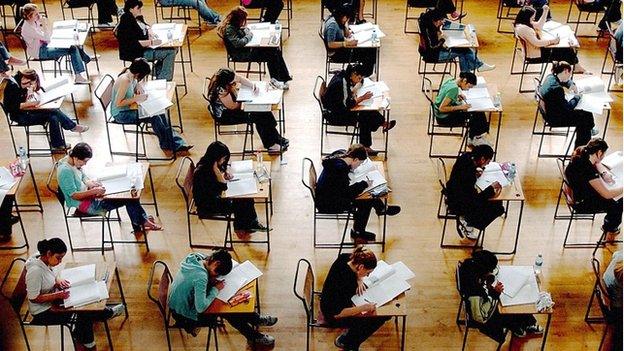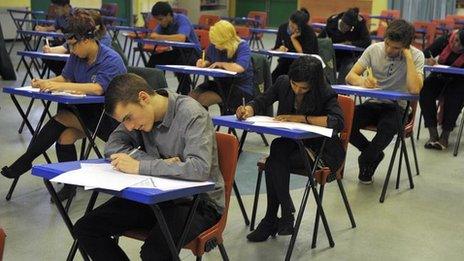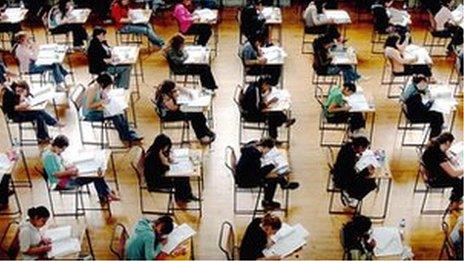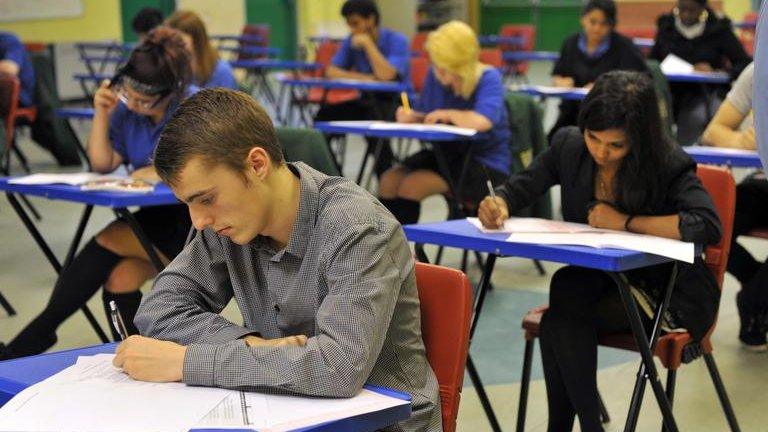New GCSE reference tests 'could be compulsory'
- Published

Thousands of teenagers in hundreds of schools are likely to have to take the National Reference Tests
New National Reference Tests to help set GCSE grade boundaries could be made compulsory for thousands of pupils in England,
The exams regulator Ofqual previously suggested the tests would be voluntary.
But the Times Educational Supplement (TES) says hundreds of schools could be forced to enter a sample of their year 11 students.
And Ofqual has confirmed to the BBC it has "discussed" making them compulsory with government officials.
Head teachers fear the tests would have to be mandatory in order to provide a nationally representative sample of pupils.
An Ofqual spokeswoman confirmed it had raised the possibility with the Department for Education but no formal request had yet been made.
Monitor performance
From 2017 Ofqual expects about 7,500 students to sit the new National Reference Tests in maths and English. They would be taken in March, a few months before GCSE exams.
Ofqual says that means about 15,000 new tests would be sat and participating schools would enter students for one or both of them.
The exams regulator points out that the Year 11 cohort is about 600,000-strong. So the new tests would be taken by some 2.5% of them.
The aim is to monitor the performance of each year's GCSE cohort, to give examiners a reference point for differences in ability between different year groups, says the regulator.
The results would allow Ofqual to make objective judgements on whether to allow grades to rise and allay suggestions of grade inflation.
The tests will be introduced for the first wave of students entered for new tougher GCSEs to be taught in schools from September.
Ofqual first announced plans for the tests last year.
The chief regulator Glenys Stacey said later, external: "I am not sure that in our culture we could insist on students taking it," adding that, "discussions are still to be had".
Last month Ofqual announced, external the National Foundation for Educational Research (NFER) would develop and deliver the tests.
'Pressured pupils'
Head teachers' leaders fear the tests would place an extra burden on pupils as they enter the final stages of their GCSE revision.
"They are very vulnerable at that time and they need to be entirely focused on their GCSEs," Brian Lightman, general secretary of the Association of School and College Leaders, told BBC News.
Mr Lightman said the union was in close consultation with Ofqual about the format of the tests.
"If we don't get the design right, pupils could be unsettled," he warned.
He said it was highly likely that the tests would have to be compulsory.
"We understand that if it's going to be a national reference test, the sample has to be representative."
"Therefore if it's not compulsory it would skew the sample. So we understand why - but it's just another pressure on young people who are already under great pressure."
Russell Hobby, general secretary of the National Association of Head Teachers, also said he could see the logic in making the tests compulsory as he believed few schools were likely to volunteer.
"But that doesn't make it right," he told the TES.
"I don't think it would be welcomed by many schools."
- Published3 April 2014

- Published25 March 2014

- Published1 November 2013

- Published6 September 2013
